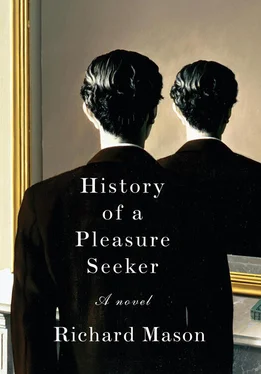The servants’ ignorance was shattered the next afternoon by a raspy-voiced newspaper boy hawking a special edition of De Amsterdamsche Lantaren , a scandal sheet whose front page proclaimed likely ruin of leading burgher. Piet was drawn to the schoolroom’s window in time to see Mrs. de Leeuw buy up the entire edition. He set Egbert an exercise in geometry and went into the kitchen, which was in a state of uproar.
Monsieur la Chaume had abandoned his sauce on the stove and snatched a copy from the housekeeper before she could incinerate her haul. The article mentioned no names, but its hints were broad, and in the leaking of the story its horrors had expanded. “Several millions of dollars” had been lost by one of the “city’s first citizens.” His “extensive collection of objets d’art ” was “likely to be sold at conducive rates.”
It was true that Maarten had been closeted in his study with various grave-faced gentlemen ever since his return from America. Hilde reported that the conversation had ceased whenever she appeared, which was not at all the usual manner of the house.
“I had better take this libelous publication upstairs,” said Mr. Blok.
Maarten Vermeulen-Sickerts, like Piet Barol, inspired instinctive jealousy in a significant proportion of other men. As he contemplated the newspaper ten minutes later, he understood that one of the friends in whom he had trusted everything had betrayed him. He did his best to manufacture a becoming Christian forgiveness. He failed and flung his Venetian-glass paperweight to the floor. Beside him, on the table it always occupied, was the silver miniature of the man on a tightrope — balancing so precariously, yet permanently preserved from disaster.
It did not comfort him.
Maarten had consumed nothing all day but three cups of coffee and two slices of rye bread; and between appointments had prayed fervently. “I can do nothing without you,” he said aloud, looking heavenwards. For the first time in many weeks he felt the stirrings of the Holy Spirit. He picked up the Bible on his desk and opened it at random, convinced that he would learn his fate, and what he read brought tears to his eyes because it was the repeating assurance of the 136th Psalm: “His steadfast love endures forever.”
Maarten took this as an indication that his relationship with the Almighty was on the mend. He felt immediately easier and made a solemn vow that if the Plaza ever turned a profit he would give a third of it away. This allowed him to believe that the Plaza might make money one day, since good would come of it. Surely the Americans would recover their delight in spending. It was so instinctive in them.
It had shamed Maarten to ask his friends for money, but since God required his humiliation, he had endured it without complaint. At an extravagant rate of interest, payable a year hence, with his entire silver collection as collateral, he had been loaned enough to keep afloat for six weeks. He was aware that his own recovery depended on that of the American financial system — but since God had caused that cataclysm in order to humble him, might He not resolve it now that His purpose had been accomplished?
He rang for food. He was very hungry, and the feast sent up by Monsieur la Chaume fortified his spirits. When he had finished, he wrote a stern and litigious letter to the editor of De Amsterdamsche Lantaren and sent Didier Loubat to deliver it. He did not imagine that this action would be taken by his servants as confirmation of the article’s contents, but when Didier returned he found Hilde in tears and Monsieur la Chaume halving the quantity of champagne he was adding to the evening’s dessert.
In the sous-terrain of the house, the day proceeded methodically. But by teatime it was clear to Mr. Blok that he should take a stand. He had worked for Maarten Vermeulen-Sickerts for twenty-five years and consumed a great deal of chivalric fiction in that time. He had often imagined following his knight into battle when all was lost, and his courage now was reinforced by having enough put by to fund a modest retirement in Amersfoort. This limitation of personal vulnerability allowed him to inhabit the role of doomed retainer with total conviction.
He called the staff together after dinner had been served and cleared. Though Agneta Hemels had refrained absolutely from intimacy with anyone, her absence was felt. It was as though she had already been seized by the debt collectors and would be followed in due course by the furniture and the sculpture and the contents of the wine cellar.
Gert Blok sat at the head of the table and opened with a calming address. He reminded his audience that it was their duty to refrain from below-stairs gossip, since Mr. Vermeulen-Sickerts’ rivals would seek information from their own servants. He exhorted them to present a confident front to the world.
“Have they really lost all their money?” asked Hilde, who did not have Mr. Blok’s savings and was nauseous with worry.
Gert Blok hesitated. To deny this would be to diminish the gravity of the crisis, and hence his own importance in mitigating it. To agree would be disloyal and might encourage Hilde and Didier to look for places elsewhere. In the end he told the truth, which was that he did not know. “What I do know is that—”
But Mrs. de Leeuw interrupted him. “This family will never be poor, Hilde. They may lose a painting, perhaps all their paintings, perhaps the china that takes you two days to polish and is never used. But they will not know cold, or hunger, or the misery of unwashed clothes all through a hot summer. It is we who will suffer.” The housekeeper was not much given to public speaking, and the sudden intensity of her feelings produced two patches of deep burgundy on either side of her narrow nose.
Mr. Blok coughed. “I object to that. Mr. Vermeulen-Sickerts will provide us each with a pension, should the worst occur. The family has always paid us well. They—”
But Naomi de Leeuw had lost all composure. “Oh yes, Mr. Blok, they have paid more than their friends pay. Twice as much.” She arranged her lips in the smile of perfect concern she wore when a guest felt unwell. “But it is so little when you think of all we do, and all they have.”
Didier caught Piet’s eye and for an instant they swayed on the precipice of laughter. But they did not laugh because tears began to well in Mrs. de Leeuw’s fierce brown eyes and in a very different voice she said: “I know you all think me cold and mean-spirited.”
There was silence. As often happens after a statement of accurate fact, those present were briefly unable to contradict it.
Piet recovered first, perhaps because, knowing her mother’s ailments as closely as he did, he was most able to feel sympathy for her. “Of course we don’t. Today has simply been—”
But she raised her hand to stop him. “You are very generous, Mr. Barol, and an expert flatterer. But I know you whisper about me behind my back. You and Mr. Loubat and Hilde. You think because I do not show all I see that I am blind. I am not!” She dabbed her eyes with the edge of the tablecloth. “You think me cold because I do not smile. But that is because I have smiled so much, at so many people who have no concern for me, that my smile has lost its meaning. In my youth I was a cheerful person. I wished often to tell you, Hilde, not to fear me. But I never could because I can no longer smile. And that is why, Mr. Blok, Maarten Vermeulen-Sickerts owes each of us far more than a pension.”
“Nevertheless,” said Hilde, less timidly than before, “I would rather have a pension than nothing at all.”
Naomi de Leeuw had made a lifelong habit of suppressing her resentments. She could not otherwise have been the flawless housekeeper she was. But the dam once breached could not be refortified, and though Mr. Blok brought the servants’ discussion to an abrupt end the patches of red on her cheeks did not subside.
Читать дальше












